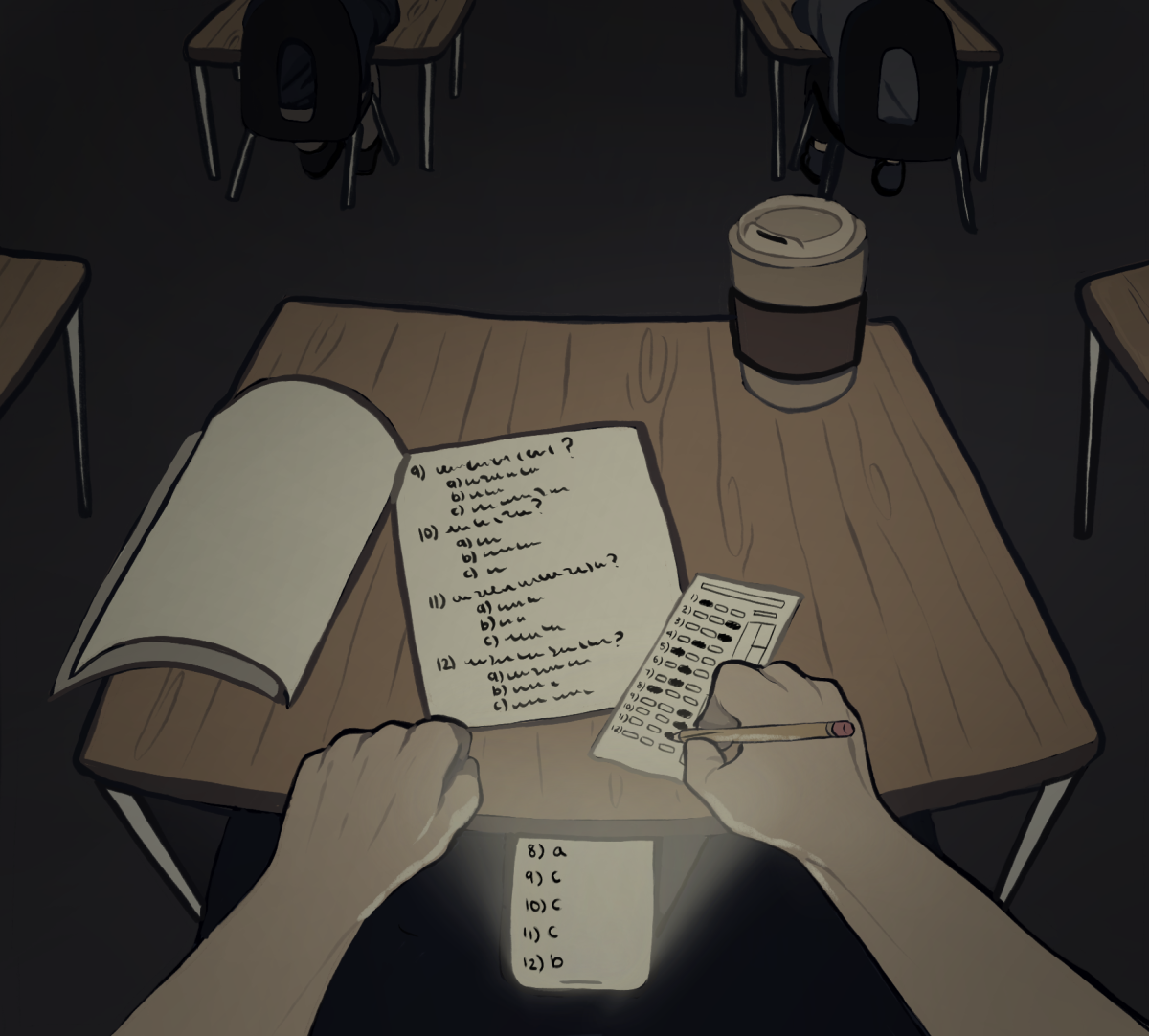He knew he was in trouble when he stepped into history class one fateful Friday. The chattering voices around him seemed to fade off into the background as his eyes zeroed onto the white board. The words, “Agenda: Chapter 4 Test” were written in bright bold red. At that moment he knew he was doomed. With three tests, four quizzes and one essay all in the span of a single week, he had been so preoccupied he had forgotten about one.
As he sat in his seat and the teacher began to pass out the tests, he pulled out his phone and pressed it tightly to his thigh, concealing it under the wooden desk. As the teacher told everyone to begin, he took a deep breath, clutching his pencil tight and discreetly unlocking his phone, he knew what he needed to do.
Due to current educational standards students are being pressured to cheat. A New York Times article reports how one year of bad grades in highschool is capable of changing a student’s entire life. Students are constantly under pressure to perform well and understand that any mistakes could lead to their downfall. With this worry hanging over their heads, cheating seems to become a much more viable option for desperate students.
The grading standards for assessments are more complex and rigid than ever before. The Oklahoma Policy Institute reported that Finland, with the highest ranked education system in the world, maintains high standards for students without preparing them for mandatory standardized testing. This offers the students flexibility with more opportunities to experiment with both learning and failure.
Dissimilarly, standardized testing pervades the American education system with SATs, ACTs and AP Tests. Students are expected to distort their minds and stuff them into the predetermined shapes these tests demand. Failure to do so is detrimental to students as standardized tests are either worth a significant portion of their grade, or are used to measure their understanding of a subject.
Because of this, many students are not given the opportunity to learn material in a way they find comprehensible. They are instead damned to either perform poorly, or resort to cheating, which seems like a difficult choice to criticize. With everything on the line concerning their future success, it only seems logical for students to cheat. They know they cannot adequately learn the material and no matter how well they may know it, if their knowledge does not meet the rigid standards of modern education it is considered invalid.
Considering how advanced the world is today, cheating is more accessible to students. According to a study by Grand Canyon University, students study from around two to more than five hours per day, not including the five to six hours they also spend at school. Students are overwhelmed with work from classes and end up having little time and motivation to properly learn all the material assigned to them.
Modern businesses have noticed the burden students carry and have taken to monopolizing off of it. Technology has allowed for the development of numerous cheating methods: AI tools, desktop sharing, previous exam banks available online, homework marketplaces and more. Students are surrounded by cheating material and easy accessibility causes them to rely on the resources as opposed to learning the material on their own. Businesses have taken to praying on these students and students are more than happy to pay the price, valuing their final grades over any monetary greed or desire to learn.
The rise in cheating coupled with the heightened standards of education has made it so the consequences that can follow are severe. In high school, cheating can result in a failing grade and disciplinary action, like suspension. Cheating on a final, however, can result in an even worse punishment, like a report to the college admissions office, or expulsion. Nonetheless, students are always punished with absolutist policies, rarely are they given the chance to redeem themselves. They are forced to make mistakes by a harsh system and never given a way to rectify the situation.
Admittedly, the ramifications do aid in preventing cheating, but the fact of the matter is, the problem is rooted in the system. Education needs to prioritize student’s well-being to promote learning over rigor. High-stress and desperation are what drive students to cheat, yet these factors have not been addressed. No matter how harsh the consequences of cheating are, no true solution can result without major reforms to the current education systems. If students are not forced into boxes and instead are encouraged to learn in their own unique ways, then they will be able to prioritize their education in a manner that does not necessitate cheating.


